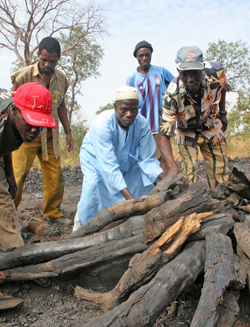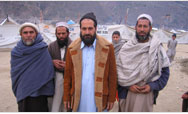You are here » Home » Telling Our Story
Success Story
By transporting directly, charcoal producers see profits more than double
Villagers Take Back Economic Control

Photo: Richard Nyberg, USAID/Senegal
Gueladio Diallo (center), president of the charcoal producers’ association in Sita Niaoulé, Tambacounda region, and his co-workers prepare a new slow-burning fire to produce charcoal.
“With USAID ... we have seen many improvements in our working conditions. Now we are own bosses. We have our own means of transport so we can avoid the itinerant middlemen and take in all the profit ourselves,” said charcoal producer Gueladio Diallo.
Gueladio Diallo makes a living out of the cliché “where there’s smoke, there’s fire.” Without heat and smoke, there would be no charcoal. And without charcoal, he would be out of a job.
In the remote village of Sita Niaoulé, in Senegal’s southeastern Tambacounda region, 43 men and heads of households have formed an association to provide for the 600 or so members of their extended families by maximizing profits from charcoal.
Piling the remains of a 10-day, 12-foot high burn of ratt and other fast-growing indigenous wood species, Gueladio, the president of the local charcoal producer association formed in 2006, said he earned much less from his charcoal before USAID stepped in to assist with the management plan.
A couple years ago, he would earn 700 CFA francs (about $1.70) for a 100-pound sack of charcoal by selling cheaply to middlemen, who transported the goods over 200 miles to the capital, Dakar. There, the middlemen offloaded their supply and made hefty profits on the backs of Gueladio and his friends.
But after USAID stepped in with its agriculture and natural resource management project, Gueladio soon was able to pocket a great deal more – $3.60 after costs for each of the 300 sacks. “With USAID… we have seen many improvements in our working conditions. Now we are own bosses,” he said. “We have our own means of transport so we can avoid the itinerant middlemen and take in all the profit ourselves.”
He already knows how he wants to spend his extra earnings. He has his eye on a new donkey cart and a few more head of cattle – the traditional means of investment among ethnic Peuls. “We can put the increased income towards addressing social problems in the village, such as transport for medical emergencies and for helping us to reach neighboring communities to participate in activities there,” he said.
Print-friendly version of this page (533kb - PDF)
Click here for high-res photo
Back to Top ^ | 

